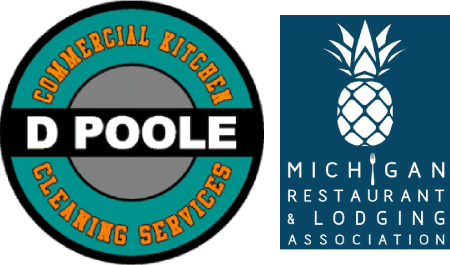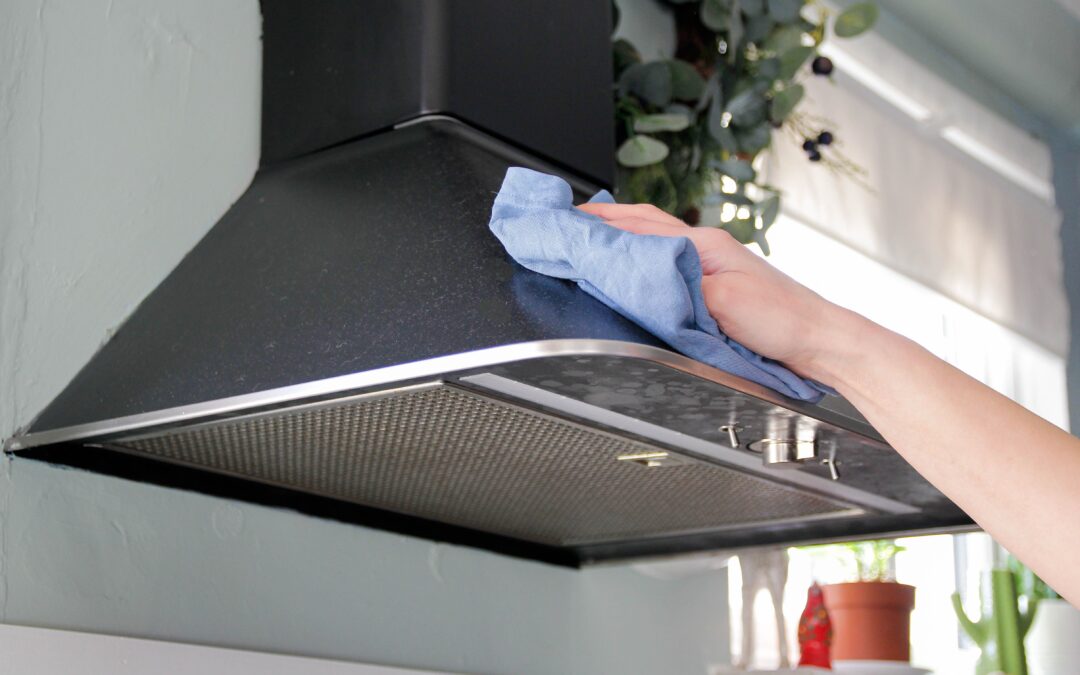You walk into your kitchen at the start of a busy day. Every countertop gleams, the floor is spotless, and the dining room is ready for guests. Everything seems in order. But have you ever stopped to wonder what’s happening above your line, inside the hood and ductwork that never make it into the routine cleaning checklist?
Most Ann Arbor kitchen owners and managers focus on what they can see. But time and again, kitchens that look perfect at eye level end up failing inspections, racking up surprise repair costs, or even shutting down after a fire. All because of one hidden area – the kitchen hood and exhaust system. It only takes a little neglect for grease and debris to start building up. You can’t see it, you can’t smell it, but the risk quietly grows with every service, every shift.
What exactly is building up in your hood right now?
Could you pass an inspection if it happened tomorrow?
Would you even know if your system was on the edge of a fire hazard?
These are questions that keep many restaurant owners up at night. If you haven’t thought about your hood and exhaust in a while, keep reading to discover what most owners miss, and how the right steps can make all the difference.

What Areas Need Regular Attention? The Full Exhaust System Breakdown
Many owners and staff believe a quick scrub of the hood’s exterior and an occasional filter rinse are enough. In reality, your entire exhaust system needs attention on a routine basis.
Here’s what you should focus on:
- Hood Surfaces: Clean both the inside and outside of the hood after every shift. Wipe away grease before it can harden. This prevents thick buildup that becomes difficult to remove and ensures visible cleanliness for inspectors.
- Grease Filters: Remove and soak filters in a degreasing solution at least once a week, or more often in high-volume kitchens. Dirty filters block airflow and let grease collect deeper in the system.
- Ductwork: Schedule professional duct cleaning several times a year. Even the most diligent daily cleaning misses the duct interior, where grease builds up out of sight. This is the most common source of fire hazards and inspection failures.
- Exhaust Fans: Grease-laden air travels all the way to the exhaust fan. Make sure the fan is included in every professional cleaning. Clogged fans can overheat, fail, or even catch fire.
- Seals and Gaskets: Inspect all seals and gaskets for cracks or looseness. Broken seals let smoke, grease, and heat escape, reducing system performance and attracting the attention of inspectors.
- Roof Components: Check the rooftop vent for stains or sticky residue. Grease that makes it this far will damage the roof over time, leading to expensive repairs and voided warranties.
Skipping any part of this system can result in missed grease, higher risks, and bigger bills down the road.

Compliance Checklist: Steps for a Clean, Safe, and Inspection-Ready Hood
Maintaining compliance in Ann Arbor isn’t just about staying out of trouble. It’s about keeping your business open and your team safe. Here’s a step-by-step checklist to help you stay ahead:
- Stick to a Set Schedule: Book professional kitchen hood cleaning regularly. Mark the calendar and treat it as essential as payroll or ordering inventory.
- Keep Accurate Records: Store all cleaning invoices, service reports, and maintenance logs in one place. This helps during inspections and proves your commitment to safety.
- Train Your Staff: Show everyone how to properly clean the hood and filters after every shift. Make this a core part of your closing routine.
- Do Routine Visual Checks: At the end of each week, take a flashlight and inspect inside the hood, the filters, and any accessible ductwork. Look for greasy spots, loose parts, or anything unusual.
- Partner with a Local Expert: Work with a trusted Ann Arbor company that specializes in kitchen hood cleaning. Professionals have the tools and know-how to reach every part of the system and can offer advice specific to your kitchen’s layout.
Fire Prevention Tips for Every Ann Arbor Kitchen
Staying compliant and keeping your kitchen hood clean also means focusing on fire prevention. Here are practical tips to lower fire risk and keep your kitchen safer every day:
- Install and Maintain Fire Suppression Systems: Make sure your fire suppression system is inspected and tested regularly. Do not ignore scheduled maintenance or repairs.
- Never Ignore Unusual Noises or Smells: A noisy fan or strange odor could be the first sign of hidden grease or a failing part. Investigate immediately and call for service if needed.
- Use Non-Flammable, Food-Safe Cleaning Products: Avoid products that leave a residue or are not designed for kitchen use. Stick with cleaners recommended by hood manufacturers.
- Act Quickly After Any Flare-Up: If there is a grease flare-up or small fire, schedule a professional inspection and cleaning right away, even if you think the problem is resolved.
- Post Emergency Procedures in the Kitchen: Make sure every team member knows what to do in case of a fire, including how to shut off the gas and trigger the suppression system.
Why Kitchen Hood Cleaning in Ann Arbor Demands More Than a Quick Fix
Kitchen hood cleaning in Ann Arbor is a critical task that goes well beyond what you can accomplish with a quick wipe-down. Here’s why every commercial kitchen needs a thorough, professional approach:
- Grease Buildup Happens Fast: Every day, cooking produces grease, smoke, and airborne particles that rise and stick to the inside of your hood, filters, ducts, and exhaust fans. What starts as a thin layer can quickly become a thick, sticky coating that is tough to remove.
- Fire Risk Increases Over Time: Grease is highly flammable. Even a small buildup inside the hood or ducts provides fuel for a dangerous fire. Without proper cleaning, one flare-up on the cookline can ignite hidden grease and cause flames to spread quickly through the exhaust system.
- Compliance with Local Codes: Ann Arbor and Michigan health and fire codes require regular hood and exhaust system cleaning. Skipping or delaying proper service can result in fines, violations, or even forced closures during an inspection.
- Equipment Lifespan Suffers: Grease and debris put extra strain on your ventilation system. Fans, motors, and seals wear out faster, leading to expensive repairs or breakdowns that interrupt your kitchen’s operation.
- Poor Air Quality: A clogged hood and exhaust system reduces airflow, making your kitchen hotter and stuffier. It can also allow smoke and odors to linger, creating an uncomfortable and potentially unhealthy environment for your staff.
- Inspection Failures: Health and fire inspectors focus closely on the hood and exhaust system. Even if the rest of your kitchen looks spotless, any visible grease buildup, loose fittings, or poorly maintained equipment can result in failed inspections or costly re-inspections.
- False Sense of Security: Many kitchen owners believe that wiping down visible surfaces or handling cleaning in-house is enough. However, most problems start where you can’t see—in the ducts, behind the filters, and on top of the exhaust fan. Only a full, professional cleaning can address these hidden risks.
Professional kitchen hood cleaning in Ann Arbor is essential to protect your business, your people, and your reputation. Quick fixes miss the real threats and often cost you much more in the long run.
How Often Should You Schedule a Kitchen Hood Cleaning in Ann Arbor?
Ann Arbor regulations, and most fire codes, recommend the following cleaning schedules for commercial kitchens:
- High-volume operations (busy restaurants, 24-hour diners): Every month
- Moderate-volume kitchens (cafes, sit-down restaurants): Every two to three months
- Low-volume kitchens (churches, seasonal operations): Every six months
If you’re unsure where your kitchen falls, err on the side of caution and schedule cleaning more often. Document each cleaning with dates and details for your records. Inspectors often ask to see proof of routine maintenance.
The Value of Partnering With a Local Professional
Keeping your kitchen hood clean and compliant in Ann Arbor is easier when you have the right help. Local experts understand area regulations and can customize a plan for your specific needs. Professional cleaners don’t just handle what you can see—they tackle the hidden trouble spots that most in-house routines miss.
DPoole Commercial Kitchen Cleaning is trusted by restaurants across Ann Arbor for thorough, reliable hood and exhaust cleaning. Their team documents every job, provides before-and-after photos, and helps you prepare for inspections with detailed records.
You can see the full list of commercial cleaning services or contact DPoole to schedule your next cleaning or ask for a compliance review.

